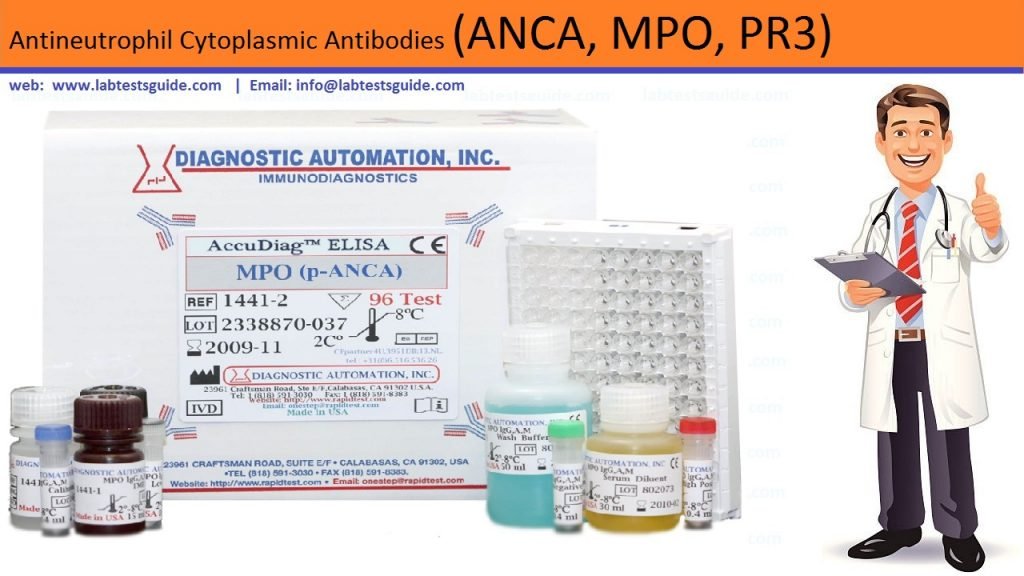Also Known As: ANCA Antibodies, cANCA. pANCA. Serine Protease 3. MPO, PR3, Anticytoplasmic Autoantibodies, 3-ANCA, PR3-ANCA, MPO-ANCA, Myeloperoxidase Antibodies, Proteinase 3 Antibodies
Test Panel: C-Reactive Protein (CRP), Complementm Urinalysis, Anti-Saccharomyces cerevisiae Antibodies (ASCA), Calprotectin,
Lactoferrin

Why Get Tested:
- For the diagnosis of Wegener’s granulomatosis.
- This is also done to follow the course of the disease and monitor the response to treatment of Wegener’s granulomatosis.
- This may be done for other autoimmune diseases.
- This test is indicated in case of vasculitis and in inflammatory bowel disease.
When to Get Tested:
- When you have symptoms such as fever, muscle aches, and weight loss or impaired kidney or lung function that your healthcare practitioner thinks may be due to a vascular autoimmune disorder.
- When you have symptoms such as persistent or intermittent diarrhea and abdominal pain that your healthcare practitioner suspects may be due to an IBD; when your healthcare practitioner wants to distinguish between CD and UC.
Sample Required:
- The patient serum is needed.
- How to get good serum: Take 3 to 5 ml of blood in the disposable syringe or in vacutainer. Keep the syringe for 15 to 30 minutes at 37 °C and then centrifuge for 2 to 4 minutes to get clear serum.
- No special precaution required.
- Separate serum as soon as possible and freeze it.
- Slides from the blood are made and perform the indirect immunofluorescent technique for the neutrophils.
- Two types of staining pattern seen for two different antibodies.
Types of ANCA
- When patient sera are incubated with alcohol-fixed neutrophils, indirect immunofluorescence shows two patterns:
- c-ANCA (cytoplasmic ANCA) is highly specific 95 to 99% of Wegener’s granulomatosis and there is diffuse granular staining of the cytoplasm of neutrophils and monocytes (by fluorescent antibody technique ).
- In respiratory disease, it is present in only about 65 % of the cases.
- All Wegner’s patients with limited disease in the kidney are not positive for c-ANCA.
- When Wegner’s is not active then % drops to 30%.
- A negative result for c-ANCA does not rule out Wegener’s.
- False positive results are rare.
- Rising titer for c-ANCA suggests relapse.
- When titer is falling indicates successful treatment.
- p-ANCA (perinuclear ANCA) produces a perinuclear pattern of staining in the neutrophils cytoplasm.
- It is found in about 50% of the patient with kidney disease.
- This is also positive (about 75%) in other autoimmune diseases like Ulcerative colitis or sclerosing cholangitis.
- c-ANCA appears to have anti-proteinase 3 specificity, while p-ANCA has predominantly anti-myeloperoxidase activity.
- Result: Negative when there is very little fluorescence or no fluorescence.
Lab diagnosis
- Serological method for the detection of ANCA.
- Detection of c-ANCA is sensitive and specific for the diagnosis of Wegener’s disease.
- A biopsy is more diagnostic.
Normal values:
- Serological method
- Not found normally in the serum.
- Negative = <1:20
- Not found normally in the serum.
- ANCA by EIA =
- Negtive = <21 units
- Weak positive = 21 to 30 units
- Positive = >30 units.
- Tissue biopsy:
- Negative for ANCA by IFA.
- In positive c-ANCA, then the results are titrated.
- In positive p-ACNA, MPO (myeloperoxidase) testing is performed by ELIZA.
- Not all p-ANCA cases are positive for MPO.
Increased level is seen in:
- Wegener’s granulomatosis (>90% positive predictive value).
- Polyarteritis nodosa
- Necrotising vasculitis.
- Inflammatory bowel disease.
- Systemic lupus erythematosus.
- Rheumatoid arthritis.
p-ANCA is not specific but these are seen in:
- Polyarteritis nodosum.
- Primary sclerosing cholangitis.
- Microscopic polyangiitis.
- Ulcerative colitis.




One Comment